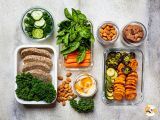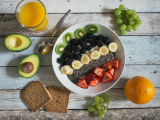Soft diet: What to eat when you have a sensitive stomach

When we feel sick to our stomach, our body asks for a break in the digestive effort. Following a bland diet gives us just what we need: light, easy-to-digest foods cooked in a way that does not demand too much from our digestive system. It is not just about eating bland foods, but about following some recommendations that will help us alleviate symptoms such as discomfort or diarrhea. The bland diet, moreover, is more varied than commonly believed. Here we will explore together the ideal foods to soothe the stomach, the most suitable cooking techniques and those foods that are best avoided during the recovery process.
Recommended foods in the soft diet
- Refined cereals: In normal situations it is better to opt for whole grains, but when we have a stomach ache, it is preferable to choose refined cereals. White rice, pasta and other refined cereals are better choices than their whole-grain versions, as they contain less fiber, which facilitates digestion.
- Fruits: It is advisable to avoid raw fruits and opt for those low in fiber. Baked or cooked apples, without skin, are an excellent choice, since they provide pectin, a soluble fiber that favors digestive health without causing discomfort.
- Vegetables: As with fruits, it is best to avoid raw vegetables. Steaming or boiling them makes them easier to digest, and they provide vitamins and minerals without irritating the stomach mucosa. Cooked carrots, zucchini and squash are excellent choices. In general, it is advisable to avoid cruciferous vegetables (such as broccoli, arugula and cauliflower), as they can produce gas.
- Dairy products: They can be consumed, but it is preferable that they are low in fat and sugar-free. Fresh cheese and natural yogurt are very good options, as they are soft and easy to digest.
- Soft proteins: Lean skinless meats, such as chicken or turkey, and white fish, which are low in fat, are recommended. Opt for steamed, boiled, baked or grilled, avoiding fried foods and strong seasonings. A boiled or soft-boiled egg is also an excellent option to obtain the necessary proteins for a correct recovery.
- Liquids, sugar-free jellies and soft drinks: Staying hydrated is essential, especially if you have experienced vomiting or diarrhea. Sugar-free jellies and chamomile or anise infusions help soothe the stomach and replenish lost fluids.
Foods to avoid if you have a stomach ache
Some foods, either by their characteristics or by the cooking methods used, may hinder digestion or increase stomach acidity. For this reason, it is best to avoid them while we are sick to our stomach. These are the foods that it is preferable to exclude from our diet temporarily:
- Acidic foods such as citrus fruits (orange, lemon) can irritate the gastric mucosa and increase acidity.
- Spicy foods and strong condiments such as chili or garlic tend to aggravate problems such as reflux and heartburn.
- Whole-grain products and foods with insoluble fiber, such as whole-grain bread or legumes, which can be difficult to digest.
- Whole milk and fatty dairy products, which tend to cause heaviness and discomfort, especially in people with lactose sensitivity.
- Energy drinks, carbonated beverages and caffeine, which can irritate the stomach and cause gas.
- Red meat and fatty or fried foods, which require a prolonged digestive process and can cause discomfort.
- Ultra-processed foods, as they often contain additives and high levels of fat or sugars, which is counterproductive for a delicate stomach.



Comments